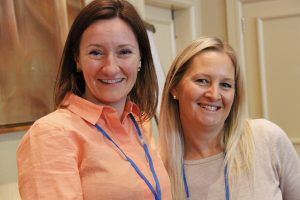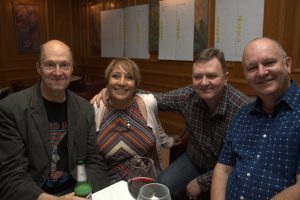30 April 1992
30 April 2017 marks the 25th anniversary of the UIC. On that date in 1992, me and my colleague at InterCity West Coast, John MackMersh, sat in my living room in Belper and decided to set up a part-time business. At that time the UK railway industry was in the run up to privatisation and our bosses Denise Lennox and Ivor Warburton were very obliging and encouraging in our little venture which eventually led to a full-time adventure. Artistic differences led to John and I dissolving the partnership a number of years later which meant we could be friends again – and we still are.
We are nothing without our clients
People often say to me ‘you must be very proud of the UIC’. Actually I am proud of our clients because the work you do readers is what actually makes a difference. The vast majority of our clients, as illustrated by the pages that follow, play a significant role in people’s daily lives – housing them and transporting them to name our two largest ‘niches’. We have played a role in helping you develop your strategies, training your Facilitators (who go on to work on critical projects) and developing your improvement and leadership skills. But it’s you who deliver.
It’s the leader that makes the difference
If I have learned one thing over the 25 years of the UIC, it is that the leader – the Chief Executive (or equivalent) – that makes the difference. If you look through this and previous Yearbooks, you will see rows and rows of (normally) smiling faces on courses or events run or facilitated by ourselves. We cover the same ground, use the same manuals, show the same flipcharts and I tell the same bad jokes and railway stories every single time. So if we do the same thing wherever we go, how come some organisations we work with show little improvement and others achieve spectacular results? It’s down to the boss. We are lucky enough to work with some fantastic leaders. It would be nice to list you all here but you know who you are. Readers, if you are curious, look through your collection of Yearbooks and work it out for yourselves. Or ask me or one of my colleagues when you see us.
The family tree
You may be interested to know how we get our clients. I looked through the ‘logo page’ opposite and, as usual, we can trace nearly all our clients – on both sides of the world – back to our three ‘originals’. Dave Power who asked me for my business card in the early 90s accounts for all our housing clients. Peter Strachan accounts for a wide variety of transport clients and Howard Arthur our healthcare clients. Curiously enough, although these three people are all UK-based, they also account for pretty much 100% of our Australian clients. Essentially people who have worked for or know one of this three have moved on or recommended us and this has led to new clients and so on. Growing a client base in this manner requires patience. In this case, 25 years of it. My colleagues will attest I am a very patient man.
The mission is everything
Another observation made over 25 years is that the mission is everything. This applies to both the UIC and our clients. Our mission (and I always feel slightly bad that it doesn’t follow the formula in the manual exactly) is ‘to do good work for good people’. This makes life easy when people ask us to do bad work (such as manipulating groups to get a pre-determined outcome) or when we encounter someone we don’t like or they don’t like us. They do exist. We move on and find someone pleasant to work with who really wants to make an effort to improve. Luckily we have found the former to be in a minority and no shortage of the latter.
What does he know? He’s only a Booking Clerk.
I remember many years ago, just after I had moved on from selling tickets, overhearing someone talking about me. “What does he know? He’s only a Booking Clerk.” This was a bit annoying at the time but over the years has grown to be really bloody annoying as this attitude is alive and well in some organisations – often about front-line staff, partners, suppliers, customers. I had never heard of Key Concept 3 then. But I have now. And so have thousands of other people, trained by the UIC over 25 years.
The work of the giants
All our work, on both the systems and consultancy sides of the business, stands on the shoulders of giants – Shewhart, Deming, Juran and Tribus. Read on to see how the original work of these great pioneers continues to transform organisations today and, in particular, what Henry Neave, Dr Deming’s ‘assistant’ in the UK has been working on.
What’s next for the UIC?
Three things:
- Continuing to work with our existing clients for longer-and-longer
- A new generation of leaders and clients as people progress and move on
- A new generation of UIC people doing more of the same, better and better
Joy in work
Dr Deming talked about ‘joy in work’. I have been lucky. I loved selling tickets (as did my dad). I enjoyed controlling trains (even though it was really hard work). I love running the UIC and working with all of you. Thank you everyone. As Laura Palmer said to Agent Dale Cooper in the penultimate episode of Twin Peaks “I’ll see you again in 25 years”.
Richard Capper



